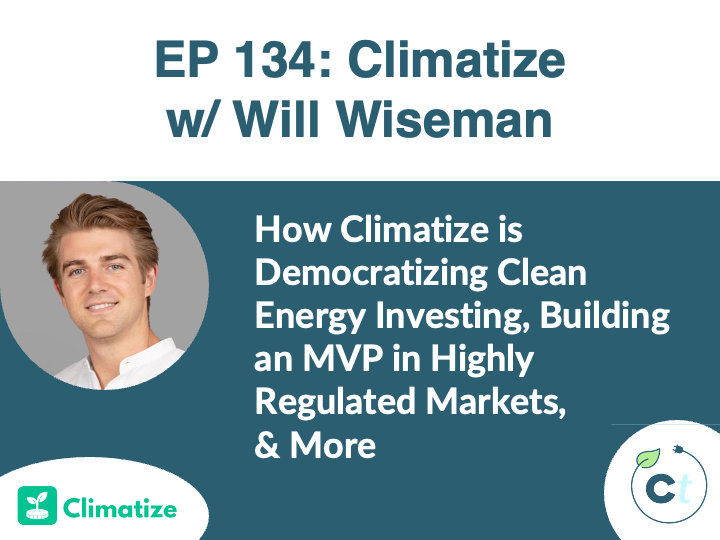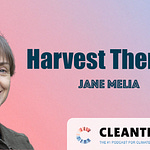🌎 Welcome to the CleanTechies PodLetter, founder edition… (did we just make a new category 🤯)
As a recap, we are rolling out a new format for you with a written component to the podcast episode that is being shared. In addition, we have some carveouts at the bottom.
What you’ll find in today’s PodLetter…
“Crowdfunding” Energy Development
A Financial Way to Protest
Community-Based Approach
From GoFundMe to GoFundMe Angel Check
Making Grants Easy (Kind of)
How You Can Get Involved
Takeaways
Show Notes
Carveouts
💡”Crowdfunding” Energy Development
Navigating how to scale existing climate technologies remains as muddled as ever. With the influx of VC dollars into the climate sector, many are wondering why we haven't seen a more rapid acceleration in the adoption of climate solutions. Enter our guest, Will Wiseman, the Co-Founder and CEO of Climatize, a revolutionary platform that is empowering community-driven solar projects to scale effectively.
Climatize is a crowdfunding platform that enables anyone, from retail investors to qualified institutions, to invest in and support renewable energy projects in their communities. By democratizing access to renewable energy investments, Climatize is leveraging a growing trend of community-based approaches to fill the financing gap in particular for smaller ticket projects where large PE investors are not participating.
To date, Climatize's efforts are already making an impact on the renewable energy landscape. The platform has successfully funded multiple community solar projects, generating clean energy and reducing reliance on fossil fuels. As Climatize continues to expand its reach, it is poised to play a pivotal role in scaling community solar projects and accelerating the transition to a sustainable future.
Oh, and they have already distributed returns to their users.
Enjoying the CleanTechies PodLetter? Please show your support by subscribing if you’re not already. We also always appreciate a share.
A Financial Way to Protest
Will considers himself someone who has always been an environmentalist, and he experienced firsthand a large number of climate protests while living in Europe. This is when it hit him there must be something wrong if the apparent most effective thing these people could do was make a cardboard sign and protest. This started him down the path of building Climatize.
Seeing this makes us wonder why there are not more accessible ways already, for the public at large to participate in the climate revolution without giving into the old O&G technique of shifting the responsibility to the consumer. There is likely an opportunity to take that general public sentiment and turn it into something more tangible. A potential opportunity there.
Community-Based Approach
One of Will’s observations is that the journey of an environmentalist can feel very isolated and lonely. A core vision for Climatize is creating a community around deploying capital for the average investor. They are exploring ways to help show who is invested in which projects so that you can get to know people who are interested in the same problems and alleviate that isolation.
One thing we’ll be thinking about is how a platform like this can really help to influence those folks who are skeptical of renewables in a positive way. How could they be against it when they can see the financial returns of these projects in short periods of time?
From GoFundMe to GoFundMe Angel Check
Once he knew he wanted to build this product, they utilized existing technology to prove the need. (WHAT WERE THE EXISTING TECHNOLOGIES) This was especially important because their product is at the intersection of two highly regulated markets: (WHAT ARE THE REGULATED MARKETS).
They first created a GoFundMe for a Kenyan solar project. This ended up catching the attention of the Co-Founder of GoFundMe, resulting in their first angel check.
By doing something on a small scale, using existing technology, they were able to prove the customer demand for such a product, this helped in their next stage. It also served as an initial method of getting in front of the future customers of their own platform.
🚨🚨🚨 Attention Hiring Managers!!! Are you struggling to find qualified candidates? Maybe getting candidates but can’t bring them across the line consistently? Or not getting sufficient applicants? — Reach out to our sponsors NextWave Partners today to help solve that for you.
NextWave Partners is a leading Global Renewables, Climate, & Sustainability recruitment consultancy solely focused on these impact areas. They are also B-Corp Certified.
Reach out to them today to help you solve your hiring challenges and get you one step closer to making an impact.
Making Grants Easy (Kind of)
After getting this early traction, they then turned to grants. What worked for them in the grant application process was first having proved the need and concept on a small scale. This made it possible to talk about what the technology is, not what it will be.
In addition, they were able to obtain pro-bono legal help to go through the regulatory process. It took them about 1 year of back and forth with paperwork to get things set up.
These two zero-cost tools helped them to move one day closer to a full-fledged two-sided marketplace. You might consider these non-traditional means early on in your startup journey.
How You Can Get Involved
If you are interested in learning more about Climatize, you can visit the company's website or download the app. You can also follow Climatize on social media for updates on the company's progress.
✍️ Takeaways:
There were a handful of good nuggets that Will shared as advice to founders.
Make it easy to use. If your user experience is not solid and your interface is not accessible and easy to understand, you are not going to get customers. Keep it simple and understandable for your users and you will experience growth.
Calculate the ROI of your fundraising process for a morale boost. Fundraising is hard and especially demotivating. When he started pitching for their equity raise, he often felt discouraged by the nos. Eventually, he realized it’s just a sales process and you don’t close everything. He did the math and realized that each conversation is worth about $4,000. So he began to see each one as $4,000. This helped him put things into perspective. This is perhaps our favorite piece of advice of his.
Hire “ready” talent early on. In the early days, they hired an army of interns and it was, in his words, a big mistake. In the end, he was spending a lot of time hand-holding. Hiring experienced talent would have saved him time and energy he could have devoted to growing the business. Ensure you are hiring talent that is “ready” to do the job on day one.
Co-founders SHOULD think differently. He stated the importance of having a Co-founder who does not think about everything the same way as you. There should be healthy debate and different viewpoints on a lot of things so that you challenge each others’ assumptions and come to a better product in the end.
📝 Show Notes:
Topics
2:26 His Career Journey
6:42 How he Looks at Impact Work
8:04 FinTech Founding as an Engineer
13:13 Why PE Isn't Filling the Need
16:40 How they "Pitch" to Consumers
20:12 Hiring & Talent
26:08 Building the Product
28:26 Advice to Founders
32:29 Future Challenges
34:59 On Making it "Real" to Climate Deniers
Links
For all your Climate, Renewables, and Sustainability recruitment needs, check out our sponsor NextWave Partners.
This podcast is NOT investment advice. Do your homework and due diligence before investing in anything discussed on this podcast.
Random Dots
Today’s episode is similar to what Kevin Kyer is doing at pyrpose.io only with a focus on the US market.
Some of the topics around how to ‘sell’ to consumers is reminiscent of the episode with Jeff Chapin from Haven Energy. Specifically on selling for the need not just selling on the ‘basis of solving climate change’.
🚨 Carveouts:
Silas
It’s been a full week of content so I’ll keep this one short.
On Wednesday, I had the opportunity to sit on a panel at Columbia Business School to offer advice to MBA students on how to recruit for climate jobs. Two main things stood out to me and serve as my main takeaways.
There is still an underlying narrative that working in climate requires a person to be highly altruistic and set aside the objectives of making money. Many of the students expressed concern about working in climate for fear of taking a much lower salary and being unable to pay their school loans. This demonstrates the need for us to be shouting from the rooftops that… 📣 “The Climate Revolution will only be successful if we tie carbon reduction and financial success!!! !!!” - okay so maybe that’s a bit aggressive, but it’s true.
If buyers, investors, talent, and regulators think that making REAL money in climate is not going to happen, we are going to be missing a huge portion of participants in this fight.There is a lack of clarity and guidance for young talent to enter into climate. Many folks have very misguided assumptions about the space and how to land a role in the space. This tells me there is no real ecosystem set up to guide them through this journey.
It’s my belief that the way to solve this issue is to have MANY more people sharing their journeys. At some point, someone will set up a really well-organized system for navigating the various areas and ecosystems inside of climate (and maybe they will find consensus on what ClimateTech really means), but for now, it needs to be crowd-sourced. If we are all picking a niche in the space and making our content for that space, we will see a lot of people learning how to navigate properly.
So, that’s my CTA for you - get out there and make some content about the niche you’re in and passionate about!
Somil
This week I started working on an investment thesis within a specific area of climate. While I can’t do into the details, it was a reminder of how complicated the investing game can be and how meticulously you have to diligence your hypothesis.
For generalist investors or even industry-focused investors with broad industries, vetting a technology requires extensive outreach to one’s network. This reinforces the importance of networking.
In today’s carve-outs, I’m walking through the 3 (non-investing related) areas that you should be building up your network if and when you decide to transition to climate investing:
Technology — whether it is hardware, software, deeptech, or some other type of innovation, there will be people who have built a somewhat similar technology even if in a different space and for a different application (think a robot that picks apples from orchards and a robot that automates an assembly line); having a good variety of technology innovation represented in your network can keep you versatile in a time where climate is all but just software
Policy — if you haven’t hard it already, the IRA is game changing for most climate companies; for that reason, getting connected with experts who are working with policy-aligned investors will go a long way in giving you someone to chat to when vetting whether a climate technology has a tailwind legislation
Science — climate has a lot of FOAKs that are both exciting in their potential but also necessary to verify to prove merit in; experts in specific areas of innovation will be able to guide you for which questions to ask and what research to conduct in order to verify the innovativeness of a new technology
These are not simple nor entirely comprehensive, but most people I talk to usually are overly indexed in one of these and negligent of the other two. In climate, that is not an option. The best investors are pulling together different resources and areas of the capital stack to fund and support climate companies. Building up your network in this way over the long-term can prepare you to do the same.
















Share this post